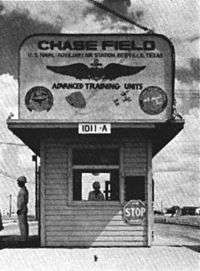Naval Air Station Chase Field
Naval Air Station Chase Field is a former naval air station located in Beeville, Texas. It was named for Lieutenant Commander Nathan Brown Chase,[1][2] Naval Aviator #37, who died in 1925 while developing carrier landing techniques for the U.S. Navy.[3]
Naval Air Station Chase Field | |
|---|---|
 | |
| Summary | |
| Airport type | Military |
| Location | Beeville, Texas |
| Elevation AMSL | 190 ft / 58 m |
| Coordinates | 28°21′51.69″N 97°39′35.32″W |
Seven buildings of the station are individually listed on the U.S. National Register of Historic Places: NAS Chase Field-Building 1001, NAS Chase Field-Building 1009, NAS Chase Field-Building 1015, NAS Chase Field-Building 1040, NAS Chase Field-Building 1042, NAS Chase Field-Quarters R, and NAS Chase Field-Quarters S.[4][5]
History

Originally under construction as Beeville Municipal Airport, it was leased in 1943 by the U.S. Navy to satisfy the increasing demand for trained pilots necessitated by World War II. Not initially intended to be a permanent base, it closed in July 1946. In August 1952, it was then purchased by the Navy to again relieve congestion at Naval Air Station Corpus Christi in preparation for the Korean War. Jet training began there in 1954.[1][2][6] It operated as Chase Field until 1968, when it was redesignated as a full Naval Air Station to meet the demand for pilot training during the Vietnam War.[7] It was tasked with preparing U.S. Navy and U.S. Marine Corps Student Naval Aviators to be strike pilots in sea-based jet fighter and attack aircraft. Training for selected NATO and Allied student jet aviators was also conducted at NAS Chase Field.
In the early 1990s the Base Realignment and Closure Commission (BRAC) decided that NAS Chase Field would be shuttered. At the time of its closure in 1993, it was home to Training Air Wing Three (tail code "C"), part of Naval Air Training Command, with training squadrons VT-24 Bobcats, VT-25 Cougars, and VT-26 Tigers flying the T-2C Buckeye and TA-4J Skyhawk II jet trainers. The wing was disestablished on 31 Aug 1992,[8] prior to the closure of the base. After its closure, the installation was redeveloped into Chase Field Industrial Complex.
References
| Wikimedia Commons has media related to Naval Air Station Chase Field. |
- Royston, Mark W. (2009). The faces behind the bases : brief biographies of those for whom our military bases were named. New York: iUniverse. p. 127. ISBN 9781440137129.
- Wolff, Jr., Henry (October 2, 1992). "Missing Noise of Jets from Chase Field". The Victoria Advocate. Victoria, Texas. p. 6A.
- "Memorial for Nathan B. Chase 1945". West Point Association of Graduates. Retrieved 25 August 2016.
- "National Register Information System". National Register of Historic Places. National Park Service. July 9, 2010.
- David Moore, Terri Myers,Matt Goebel, and Diana Nicklaus (March 30, 1994). "National Register of Historic Places Multiple Properties Documentation: Historic and Architectural Resources of Naval Air Station Chase Field, Beeville Vicinity, Bee County, Texas". Retrieved February 20, 2017.CS1 maint: multiple names: authors list (link)
- "Naval Air Station, Beeville". Handbook of Texas Online. Texas State Historical Association. Retrieved 25 August 2016.
- Disposal and reuse of Naval Air Station Chase Field: Environmental Impact Statement. United States. Navy. 1995. p. 3–1. Retrieved 25 August 2016.
- Naval Aviation News Nov–Dec 1992 p. 7
External links
- Abandoned & Little-Known Airfields: Chase Field
- "National Register of Historic Places, Multiple Property Documentation Form, Historic and Architectural Resources of Naval Air Station Chase Field" (PDF). National Park Service. Retrieved 25 August 2016.